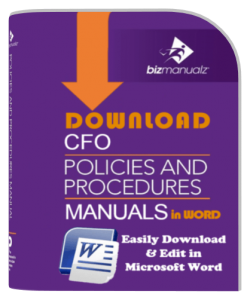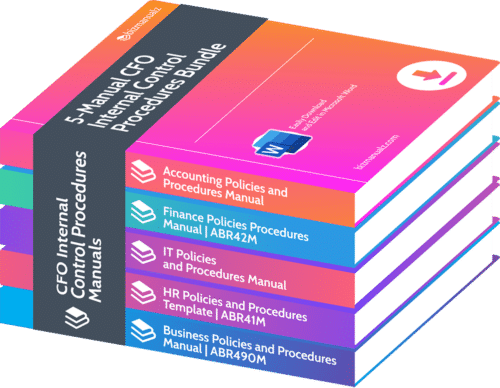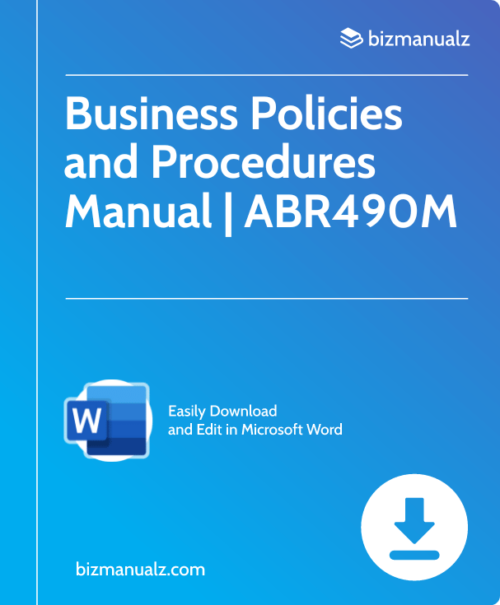What Are the Top Ten CFO Responsibilities?

As the Chief Financial Officer (CFO) of your company, you are responsible to the company’s Board of Directors for all accounting and financial matters. You must establish company-wide objectives, policies, procedures, processes, programs, and practices to assure the company of a continuously sound financial accounting structure. Surely the CFO responsibilities are described in your CFO Job Description, right? What Are the Top Ten CFO Responsibilities?
Top CFO Responsibilities

The CFO Series provides a risk reducing framework of financial internal controls for the ten core accounting cycles. Each financial cycle focuses on a key element of business accounting and, therefore, should be covered in your company’s financial accounting policies and procedures manual.
What are the responsibilities of a Chief Financial Officer? Are the CFO responsibilities and duties clear in your organization? Let’s take a look at the CFO role and the top ten CFO responsibilities found in a typical CFO job description:
1. Cash Flow
As a new Chief Financial Officer, your job is to control the cash flow position throughout the company, understand the sources and uses of cash, and maintain the integrity of funds, securities and other valuable documents. You receive, have custody of, and disburse the company’s monies and securities. New CFO responsibilities include the authority to establish accounting policies and procedures for credit and collections, purchasing, payment of bills, and other financial obligations. Cash is king and the flow of cash, or cash flow, is the most important job a new CFO has in any company.
2. Company Liabilities
After cash flow, part of the new CFO responsibilities is to understand all of the company’s liabilities. A company has many legal contracts, statutory & tax obligations, hidden liabilities in the form of contingencies, leases, or insurance summaries, and expectations from loan covenants and/or the board of directors. As a new CFO, if you’re not watching out for the liabilities, who is?
3. Company Performance
The new CFO must understand the company business model for generating customer value and translate the operational metrics into measures for performance. The new CFO is the company scorekeeper using tools like the balanced scorecard, dashboards, and financial statement ratio analysis to communicate both the company’s expected and actual financial performance.
4. Department Supervision
In a small organization, the CFO is the supervisor of Accounting, Finance, HR, and IT. In a larger company, the CFO responsibilities may only include the Accounting and Finance functions. Either way, the new CFO supports the company’s accounting and financial functions using job descriptions, policies, and procedures, and methods for automating document control.
5. Financial Relationships
As a new CFO, you establish and maintain lines of communication with investment bankers, financial analysts, and shareholders in conjunction with the President. You administer banking arrangements and loan agreements and maintain adequate sources of capital for the company’s current borrowings from commercial banks and other lending institutions. In addition, you invest the company’s funds and administer incentive stock option plans.
6. Finance or Raising Capital
You would think that finance is one of the key CFO responsibilities. Yes, it is important, but it comes after other more pressing operational issues, like those listed above. The new CFO will establish and execute programs for the provision of capital required by the company, including negotiating the procurement of debt, and equity capital, and maintaining the required financial arrangements.
As the new CFO, you’ll coordinate the long-range plans of the company, assess the financial requirements implicit in these plans, and develop alternative ways in which financial requirements can be satisfied.
7. Financial Obligations
As the new CFO, you need to approve all agreements concerning financial obligations, such as contracts for raw materials, IT assets, and services, and other actions requiring a commitment of financial resources.
8. Record Control
The new CFO is responsible for the financial aspects of all company transactions including real estate bids, contracts, and leases. The CFO also provides insurance coverage, as required, ensures the maintenance of appropriate financial records, prepares required financial reports, insures audits are completed in time and statutory book closing occur.
One of the primary CFO responsibilities is ensuring company compliance with financial regulations and standards, like Sarbanes-Oxley, the IRS Tax Code, and GAAP (and soon, IFRS).
9. Shareholder Relations
A new CFO analyzes company shareholder relations policies, procedures, and information programs, including the annual and interim reports to shareholders and the Board of Directors, as well as recommends to the President new or revised policies, procedures, or programs when needed.
10. Budgeting and Expense Control
Budgets are a fact of life, and the new CFO is responsible for overseeing the budget process, collecting the inputs, and comparing the company’s actual performance with estimates (the budget). It is an ugly process that falls within the CFO area of control.
Accounting Policies and Procedures are CFO Responsibilities
As a new CFO, free sample accounting procedures are helpful to serve as a model, or framework, for your own accounting policies and procedures. Save time. The CFO Accounting Policies and Procedures Manuals set contains 262 procedures you can use to address the ten accounting cycles within your CFO responsibilities.
Download Free Policies and Procedures to see how easy it is to edit MS Word Templates to build your own financial accounting policy and procedure management system. Bizmanualz OnPolicy procedure management software application can help you automate your document control process to easily maintain your conformance to critical compliance standards like Sarbanes-Oxley, ISO, ITIL, CoBit, FDA, or JCAHO. Sign up for a free software trial today.

















I had no idea that the CFO is in charge of working with banks and loans. I can only imagine how stressful this job can get especially if it is a large company where tons of things can go wrong. I am glad that they are companies that can help the CFO keep track of everything and give newer ones advice.
An informative article, Being a Chief Finance Officer is a difficult and very challenging task. Hence, a good CFO must have wise decision-making skills as well as great critical thinking skills to maintain good accounting as well as financing operations.
Excellent post. A CFO is visionary and more adaptable to the changes. He maintains the cash flow and keep on finding what could be the best venture for the company. A CFO is an analytical wizard who is the best at managing risk and people.
Great article! CFO’s are the lifeline of the company. They have a better understanding of the business plans and they also have access to financial and customer data across the organization. As a result, a good CFO can develop actionable data to inform decision-making. In addition, the CFO is not tied to any one business, but rather focuses on the overall results of the company; therefore, the CFO can remain unbiased when developing strategic alternatives. For this reason, the CFO is well-equipped to assist and advise the CEO.